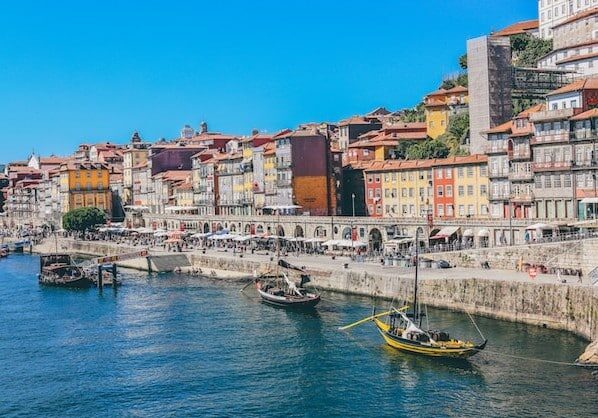
These two programs serve divergent purposes and have specific eligibility criteria.
The Portugal Golden Visa program primarily revolves around investments. It allows individuals to obtain Portuguese residency by making substantial financial commitments, such as cultural and artistic donations, investment funds, and more. This is a good option for individuals who want flexibility regarding their location, as it requires them to spend an average of just seven days a year in Portugal to maintain their residence permits.
On the other hand, the Portugal D2 Visa, also known as the Entrepreneur or the Startup Visa, targets aspiring entrepreneurs, business owners, and independent service providers, enabling them to establish or expand their ventures in Portugal. To be eligible for a D2 Visa, an applicant’s income must come from a business they started or bought.
Both residency visas allow the holder to seek permanent residence or citizenship in Portugal after five years, but each has a different set of requirements.
This article offers a comparative analysis between the D2 Visa vs Portugal Golden Visa, outlining their fundamental differences to help you choose which one aligns better with your specific goals and circumstances. Have a look below to learn more about these two residency visas.
D2 vs Portugal Golden Visa: An Overview
About the D2 Visa
What is the D2 Visa?
Also known as the Immigrant Entrepreneur or the Freelancer Visa, the Portugal D2 Visa is designed for non-European Union (non-EU) citizens seeking to either start a new business in Portugal or extend their existing business to the country.
This residency visa was created by the Portuguese government to attract foreign capital and increase external resources and investments to boost the Portuguese economy.
The Portugal D2 Visa grants you temporary residency in Portugal. With it, you’re eligible to invest in an existing Portuguese company.
Portugal’s D2 Visa has two distinct categories: The entrepreneur route and the independent service provider route. The entrepreneur route suits those wishing to start a new business or extend an existing one into Portugal. In contrast, the independent service provider route is designed for those offering services to local or global clients.
Issuance
If you are a non-EU/EEA/Switzerland freelancer, entrepreneur, or independent service provider, you can apply for a Portuguese D2 Visa.
Key benefits
Business opportunities
Visa free travel within the Schengen Area
Family
reunification
Pathway to citizenship
Residency
rights
- Business opportunities in the European market: With the Portugal D2 Visa, you can start a new business in Portugal, invest in existing businesses, or engage in entrepreneurial activities there. Portugal’s prime location in Europe allows entrepreneurs to network conveniently with other countries in the European market.
- Travel within the Schengen Area: D2 Visa holders have the same travel rights as European citizens. They can freely enter and travel to 27 countries in the Schengen Zone without an additional visa.
- Family reunification: The Portugal D2 Visa often allows for family reunification, meaning your family, including your partner, children, parents, or dependent siblings, can join you in Portugal. This means you could all enjoy life in a country that ranked seventh in the Global Peace Index and has a strong economy, and your children would be able to attend Portuguese schools.
- Pathway to permanent residency and Portuguese citizenship: After five years of legal residency in Portugal, you may become eligible to apply for permanent residency, which includes passing a basic Portuguese language test.
- Residency rights and access to services: With the temporary residency permit, you and your family will have access to Portuguese state healthcare, and your children can enroll in the public education system, ensuring essential services for your family’s well-being.
About the Golden Visa program
What is the Golden Visa?
The Portugal Golden Visa allows non-EU citizens to obtain a residence permit in Portugal by making a qualifying investment in the country.
Also regarded as the Residence Permit program, the Portuguese Golden Visa was created in 2012 to attract foreign capital and investments during their economic recovery from the subprime crisis.
The Golden Visa grants qualifying investors and their family members the right to live, work, and study in Portugal.
Issuance
The Golden Visa is for non-EU citizens interested in obtaining temporary residency in Portugal through significant investments.
Key benefits
Family
reunification
Attractive investment options
Visa free travel within the Schengen Area
Pathway to citizenship
Low physical presence needed
- Family reunification: A major benefit of the Golden Visa is that your dependent family can be included in the application. This means your family can also enjoy the same freedom of opportunities and a second residence in Portugal.
- Attractive investment options: The Golden Visa offers several attractive investment options, including donations, capital transfer, venture capital fund opportunities, job creation, and research activities. Investors can choose the option that best suits their financial goals and preferences, including affordable investments starting from €250,000.
- Free movement within the Schengen Area: Golden Visa holders can freely enter and move within the Schengen Area’s 27 countries without needing an additional visa.
- Pathway to permanent residence permit and Portuguese citizenship: Once you have lived in Portugal for five years, you may become eligible to apply for permanent residency and Portuguese citizenship (after passing a basic Portuguese fluency test), which will enable you to get a Portuguese passport.
- Low physical presence requirement: The Golden Visa program typically has a minimum stay requirement in Portugal (14 days every two years), making it accessible to investors who do not want to live in the country full-time.
Is Portugal’s Golden Visa Program ending?
No, the program is not ending. On 19 July 2023, the Portuguese parliament voted to restructure the program, so there will simply be changes to what type of investment will qualify for the scheme.
On 7 October 2023, the law came into force, and the Golden Visa by real estate investment and capital transfer are no longer eligible for the program. So, in short, you can still apply for the program, but rather than real estate investments, you can consider subscribing to an investment fund
For more information, including continuous updates on this visa category, please refer to our articles: Portugal Golden Visa Ending: Everything We Know So Far and Golden Visa Changes.
D2 Visa vs Golden Visa Portugal: Main Differences
Purpose
The purpose is the main difference between the Portugal D2 and the Golden Visa. The Portugal D2 Visa is primarily intended for individuals who want to engage in entrepreneurial activities in Portugal. It is designed for those looking to start a new business, expand their existing business, or invest in entrepreneurial ventures within the country.
The Golden Visa is an investment-based residency program designed for foreign citizens who wish to obtain temporary residency in Portugal by investing in the country.
Eligibility criteria

- The acquisition of a Portuguese company
- Having a pre-existing company abroad
- Intending to open a branch in Portugal or proposing a comprehensive business plan for a new company in Portugal
The applicant of the Freelancer Visa will be required to demonstrate their business’s potential economic and social contributions to Portugal.
To be eligible for the Portuguese Golden Visa, individuals must:
- Be a third country national (this means non-EU, non-Swiss, or non-EEA nationals)
- Be able to prove the source of their investment funds (there’s a minimum investment of €250,000)
- Have a criminal record certificate proving the absence of conviction in a crime punishable in Portugal for 1 year or more
- Spend a minimum of 14 days in Portugal for each two-year period (this is called the stay requirement)
Required time spent in Portugal
The D2 Visa requires you to live in Portugal for most of the year to maintain your residency permit. The rule is that you spend no more than six consecutive months or eight non-consecutive months outside of Portugal for the duration of your residence permit. In some cases, longer periods of absence may be permitted for professional or force majeure reasons.
The Golden Visa Program, on the other hand, has more lenient stay requirements compared to the D2 Visa, making it attractive to individuals who aren’t planning on living in Portugal full-time. Holders of the Golden Visa must spend 14 days in Portugal for each two-year period. However, it’s important to note that while there are no stringent stay requirements, you must maintain your investments in Portugal and meet the program’s renewal criteria to keep your residency status valid.
So, when choosing between a D2 Visa and Portugal’s Golden Visa, it’s essential to factor in your travel needs. Opting for the Golden Visa allows you the convenience of a mere seven consecutive days of stay in the country. In contrast, if your business demands frequent travel, the D2 Visa might be the better fit since it mandates a continuous presence in Portugal. Your decision should ultimately align with your unique situation and the purpose of your stay.
Investment requirements
The D2 Visa doesn’t have a minimum investment amount. But, to qualify, the applicant must have a solid business plan and be able to demonstrate “proof of means of subsistence.” Usually, this implies having sufficient funds for at least 12 months, equivalent to the Portuguese minimum wage. This income needs to come from a business you started yourself or a business you buy.
To qualify for Portugal’s Golden Visa, an investment must be made. Applicants can invest in a venture capital fund or private equity fund, scientific research, and Portuguese cultural projects. These qualifying investments for the Golden Visa applications usually range between €250,000 and €500,000. There is a 20 percent discount for an investment in Portuguese arts and national cultural heritage projects in one the nation’s “low density areas.”A low density area is an area that has fewer than 100 inhabitants per square km and/or a per capita GDP of less than 75 percent of the national average.
Tax requirements
As a holder of either the D2 or the Golden Visa, you can be eligible to forward an application for the Non-Habitual Residency (NHR), an exclusive favorable tax regime.
The NHR status offers preferential tax treatment for those with income generated within Portugal. While NHR is ending for new applicants, there is a new regime, known as the Incentivised Tax Scheme, which offers similar tax incentives for those who qualify.
If you’re a D2 Visa holder, you must maintain residency in Portugal and show proof of accommodation (either a rental contract or a purchased property).
It’s also recommended you hire an accountant who’s knowledgeable about the Portuguese tax system. As you’re establishing a Portuguese limited company (LDA), you’ll need to pay corporation tax every year, along with social security contributions.
Golden Visa holders are not required to live in Portugal; therefore, they won’t be seen as tax residents unless they relocate there. If that’s the case, you will only be liable for Portuguese tax on local sources, such as real estate investments. You can choose to begin the NHR clock if, and when, you eventually choose to move to Portugal.
The State Budget Law for 2024 determined the end of the NHR regime from 1st January 2024. However, certain individuals can still apply up until 31st March 2025, and the scheme is being replaced by the Tax Incentive for Scientific Research and Innovation, which has now been implemented. To learn more, please refer to Is The Portugal NHR Ending?Is NHR ending?
Comparing D2 and Portugal Golden Visa: Application Process
D2 Visa Portugal application process

- Gathering the necessary documents
- Acquiring a Portugal taxpayer identification number (NIF)
- Opening a business bank account and transferring funds to it
- Securing long-term accommodation in the country through either purchasing or renting a property for a recommended minimum duration of one year, even if an early termination clause is included
- Applying online via either VFS or the E-Visa Portal
You’ll submit your documents, including your business idea, to the Portuguese Consulate or VFS in your jurisdiction.
The Portugal D2 Visa processing time is up to 60 days. If approved, you will be issued a four-month Portugal D2 Visa to travel to Portugal to apply for temporary residency.
Golden Visa application process
To apply for the Golden Visa, you’ll have to follow the steps below:
- Gathering the necessary documents
- Decide on which investment you will move forward with
- Acquiring a Portuguese taxpayer number (NIF)
- Opening a Portuguese bank account and transferring funds to it
- Completing your fund investment
- Once you have made your qualifying investment and have your paperwork ready, you will submit your pre-application online to AIMA (the immigration authorities).
- After analyzing your pre-application, AIMA will provide you with available dates for the biometrics appointment.
After your biometrics, your investment visa will be approved by AIMA (the former SEF, Portuguese Immigration and Border Service) in around six months.
It’s important to note that Golden Visa applicants can open a Portuguese bank account to transfer their investment funds.
Cost comparison D2 Visa vs Golden Visa
The main financial considerations of a D2 Visa application are operating your business, which will largely depend on your business plan (consider costs such as business licenses and insurance), as well as the cost of relocating to Portugal and getting accommodation (which will likely cost at least €600 or €700 depending on which city you in live in). You’ll also need health insurance until you receive your residence permit and can access the public healthcare system. This could cost around €400. Then, there is the consular fee of around €90.
Your biggest expense for the Golden Visa will be the investment itself, starting from €200,000. If you relocate to Portugal, you’ll also have to factor in the cost of relocation, accommodation, and health insurance. The fees involved in applying for the Golden Visa are much higher than for the D2 (and other residency visas), totaling roughly €6,000 for a single applicant. That’s why qualifying applicants are allowed to open a Portuguese bank account to make their financial transfers.
Permanent Citizenship Through D2 or Golden Visa Portugal
The Portugal D2 Visa and Golden Visa offer holders the possibility of obtaining permanent residence and Portuguese citizenship.
Please note that if you want to obtain citizenship, you may have to pass the Portuguese language test.
Golden Visa or Portugal D2 Visa: Which One to Choose?
The Portugal D2 Visa is the right choice for you if:
- You plan to start and manage a business or invest in an existing one in Portugal
- You have a well-defined business plan outlining your investment and job creation goals
- You are willing to reside in Portugal for a significant portion of the year to manage your business actively
The Portuguese Golden Visa is the right choice for you if:
- You have a substantial amount of capital to invest in one of the Portugal
- You want to obtain European residency but do not necessarily plan to live in Portugal full-time. The Golden Visa allows for occasional visits.
- You want to have a solid backup plan for your future, whether for personal, financial, or geopolitical reasons, and the Golden Visa provides a stable residency option in Portugal, which is part of the European Union.
Category | D2 Visa | Golden Visa |
Intended for | Entrepreneurs | Investors |
Minimum investment requirement | No minimum investment amounts | €250,000 |
Criteria to be eligible | Be a non-EU/EEA/Switzerland freelancer, entrepreneur, or independent service provider | Make a qualifying investment in Portugal |
Visa fees | Approximately €90 | €773.74 (online application submission), €7,730.10 (granting the permit), €3,865.79 (per renewal) |
Permanent residency | After 5 years of uninterrupted living in Portugal | After 5 years |
Stay requirement | Requires you to live in Portugal | Minimum of 14 days every 2 years |
Rights | Live, work, study, healthcare | Live, work, study, healthcare |
Family members | Yes, through the family reunification process | Yes |
Visa free movement | Schengen Area and certain EU countries | Schengen Area and certain EU countries |
Why Choose Us?
Global Citizen Solutions is a boutique residency and citizenship-by-investment company focused on finding the right investment, citizenship, or residency program for individuals across the world.
With offices across the globe and over 50 years of combined experience in immigration, law, and investment, Global Citizen Solutions delivers unmatched guidance for getting the D2 Visa and the Golden Visa.
Global Citizen Solutions also reduces the hassle and stress of attaining your visa. The process is supported by our innovative Be System®, which provides real-time visa updates. In addition, our trusted legal experts ensure your application goes through smoothly.
Our experienced lawyers navigate the entire process, handling bureaucratic intricacies and legal matters. We also have a locally rooted real estate division, ensuring a seamless transition to your new home.
Contact us today for a free consultation to see how we can understand your objectives and help you move towards becoming a global citizen.

Frequently Asked Questions about the D2 vs Portugal Golden Visa
What are Golden Visas?
Golden Visas, also known as investment visas or residency by investment programs, are immigration programs offered by various countries to attract foreign investors, entrepreneurs, and high-net-worth individuals. These programs typically grant permanent residency or citizenship to individuals who make substantial financial investments in the host country.
What are the alternatives to the Golden Visa for Portugal?
Portugal offers alternatives to the Golden Visa program for individuals seeking to obtain residency or citizenship in the country. The D7 Visa (Passive Income Visa or Retirement Visa), for instance, allows non-EU nationals of any age to live in Portugal on their own passive income, including social security, pensions, rental income, or income from shares.
The Portugal D2 Visa is a residence visa designed for freelancers, entrepreneurs, and independent service providers seeking to open a company in Portuguese territory or open a branch of their already existing company in the country.
A relatively new alternative solution is the D8 Digital Nomad Visa, which is ideal for an individual with a remote job who intends to relocate to Portugal. It requires a monthly salary of €3,280 from remote work (which can include a remote job or freelance clients).
What are the investment options for the Portuguese Golden Visa
The Portuguese Golden Visa program offers various investment options. Some of the most common are donations, investment funds, and investing in a business with job creation, and stocks.
Real estate (property purchases, hotel redevelopment schemes, investment in a hotel or commercial property that’s being redeveloped) and depositing capital into a Portuguese bank account (known as the capital transfer route) were discontinued as investment options in October 2023.
Is Portugal getting rid of the Golden Visa?
The Portuguese Golden Visa program is not ending. However, certain investment types, such as real estate investment and capital transfers, will no longer be available.
Since real estate investments were discontinued, the most popular investment has been to subscribe to an investment fund, such as a venture capital fund or a private equity fund.
Can I work in Portugal with a D2 Visa?
Yes, you can live, run a business, and work in Portugal after getting a residence permit based on the D2 Visa.
What is the D2 Visa Portugal minimum investment?
There’s no minimum investment capital set for the D2 Visa, but you must prove that you have adequate financial resources to support yourself (and any family members you include in your application) for one year.
The financial resources required are calculated based on the current Portuguese minimum wage. You’ll need to show 100 percent of the minimum wage for yourself, 50 percent extra for a spouse (or partner in a civil partnership recognized by the Portguese state) and 30 percent extra for each dependent child. In 2024, the minimum wage is around €11,480 annually, so factor that in with the number of dependents you have.
To apply, the first step is to come up with a good business idea, and then you should prepare a solid business plan to demonstrate the financial viability of your business or venture in Portugal.
Is there an income requirement for the D2 Visa?
The financial requirement for the D2 Visa typically involves demonstrating that you have the necessary capital to establish or invest in a business, as well as sufficient financial means to cover your living expenses in Portugal.
What is the difference between the D2 Visa and the D7 Visa in Portugal?
The D2 Visa, also known as the Freelancer Visa or Startup Visa, is designed for non-EU citizens seeking to either start a new business in Portugal or extend their existing business to the country. The D7 Visa, also known as the Passive Income Visa or Retirement Visa, is for allows non-EU nationals to live in Portugal provided they have a source of stable passive income.
What are the alternatives to the D2 Visa?
One alternative to the D2 Visa is the D7 Visa. Also known as the Passive Income Visa, it allows non-EU citizens to apply for residency in Portugal, provided that they have a reasonable passive income. To qualify, you need to meet minimum passive income requirements of earning a sufficient passive income above the Portuguese minimum wage (€820 per month).
How do I get an Entrepreneur Visa in Portugal?
To get an Entrepreneur D2 Visa, you must open a new company in Portugal or buy an already working business or its share. There is no minimum investment threshold for the D2 Visa, but you must prove you have finances or a venture capital funds investment to start and operate your business.
How can I convert a D2 temporary residence permit into EU citizenship?
The D2 Visa is a temporary visa with a limited validity period. It’s a stepping stone to a longer-term residency permit in Portugal.
Here’s how it works:
- Temporary residence permit: After entering Portugal with your D2 Visa, you must apply for this permit within four months at AIMA (the Portuguese immigration office). This permit is typically valid for two years.
- Renewals: You can renew your permit every two years if you demonstrate you’re still running your business and meeting the residency requirements (like spending enough time in Portugal).
- Permanent residence and citizenship: After five years of legal residency in Portugal, you can apply for permanent residence or Portuguese citizenship.
Which Portuguese business sector can I start a company in with the Entrepreneur Visa?
The D2 (Entrepreneur) Visa in Portugal offers great freedom when choosing a business sector to launch your company. Unlike some programs, the Portuguese government doesn’t restrict applicants by industry, allowing you to capitalize on your existing skills and interests to pursue business opportunities that suit you.
Your business could be relatively small in scale; you could open a coffee shop, for example, but it must be financially viable.
For a successful application, consider factors like market demand, competition, and government support. Some sectors that might be a good fit for an Entrepreneur Visa startup include tourism, technology, e-commerce, renewable energy, oil production, or professional services if you have specialized skills to offer.
D2 Startup Visa vs Golden Visa in Portugal: Which is best?
Having a Golden Visa requires only a 7-day consecutive stay in the country. Conversely, with a D2 Visa, you must remain in Portugal continuously unless your business obligations necessitate travel. Due to this requirement, we believe that the Golden Visa would be more advantageous for most individuals compared to the D2 Visa.
How does the residency requirement for the D2 Visa differ from the Portugal Golden Visa?
The D2 Visa requires more time spent in Portugal than the Golden Visa. Golden Visa holders are required to spend 14 days every two years in Portugal. The D2 Visa has a minimum stay requirement of at least four months during your first year and six months throughout the subsequent years.


